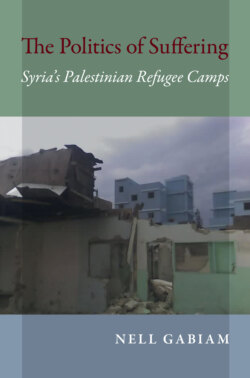The Politics of Suffering

Реклама. ООО «ЛитРес», ИНН: 7719571260.
Оглавление
Nell Gabiam. The Politics of Suffering
THE POLITICS. OF SUFFERING
Contents
Acknowledgments
Note on Transliteration
Introduction
From Humanitarianism to Development
The Politics of Suffering versus the Politics of Citizenship
Fieldwork in Syria
1Informal Citizens. Palestinian Refugees in Syria
A Warm Welcome in Syria
The General Authority for Palestinian Arab Refugees (GAPAR)
The Sites of the Neirab Rehabilitation Project. Neirab Camp
Ein el Tal Camp
Syria’s Endorsement of Development in Palestinian Refugee Camps
The Limits of the (Syrian) State
2From Humanitarianism to Development. UNRWA and Palestinian Refugees
Emphasizing Development
UNRWA’s Financial Crisis
A Global Shift in Assistance to Refugees in Protracted Situations
A Change in the Attitude of Arab Host States
A Shift in Refugee Attitudes
UNRWA and Palestinian Refugees
UNRWA in Syria
The Different Perceptions of UNRWA
3Ṣumūd and Sustainability. Reinterpreting Development in Palestinian Refugee Camps
Sustainable Development
Participation as Control
Palestinian Refugees Debate Sustainability
Sustainability as Resilience
Ṣumūd as a Guiding Concept
4“Must We Live in Barracks to Convince People We Are Refugees?” The Politics of Camp Improvement
Camp Improvement in Historical Perspective
Improving the Neirab Barracks
Improving the Barracks
Neirab Camp as a Laboratory for Urban Development
The Barracks as Witness
5“A Camp Is a Feeling Inside” Urbanization and the Boundaries of Palestinian Refugee Identity
Space and Stigma
The Camp from an Ethnographic Perspective. A Camp Is a Racialized Space
A Camp Is a Political Space
A Camp Is a Feeling Inside
The Desert, the Camp, and the City
Yarmouk as an Exceptional Place
Conclusion. Beyond Suffering and Victimhood
The Outcome of the Neirab Rehabilitation Project
Development and the Right of Return
The Camp as a Laboratory of Knowledge
Toward a New Global Humanitarian Order?
Epilogue
Notes. Introduction
1. Informal Citizens
2. From Humanitarianism to Development
3. Ṣumūd and Sustainability
4. “Must We Live in Barracks to Convince People We Are Refugees?”
5. “A Camp Is a Feeling Inside”
Conclusion
Epilogue
References
Index
Отрывок из книги
THE POLITICS OF SUFFERING
Paul A. Silverstein, Susan Slyomovics, and Ted Swedenburg, editors
.....
In addition to expressing their suffering as emotional pain resulting from the injustice of living in forced exile, Palestinian refugees also saw it as a political tool. Suffering took on the form of stoicism, something that needed to be endured to maintain the memory of exile and actualize the narrative of return.6 Stoicism dignified Palestinian suffering understood as part of a larger struggle for liberation and return. Those who earned a camp community’s respect were those who had struggled for Palestinian freedom through their political activism, especially those who had shed blood for the cause. Most were those who lived in humble conditions in the camp, not those who had achieved the dream of modernization, who lived in villas and were economically prosperous, who met the international indicators of well-being that are important to UNRWA. Anthropologist Rosemary Sayigh notes that when Palestinians embraced resistance and armed struggle in Lebanon in the late 1960s, the notion of struggle was closely tied to a “special capacity for suffering” (1979:166). UNRWA’s development discourse is invested in bestowing dignity in the form of “capacity building,” “self-reliance,” and economic prosperity but not in the form conferred by suffering that is viewed strategically, as sacrifice in the name of a larger political struggle.
There is now a solid body of literature exploring the relationship between suffering and political agency (Allen 2009; Asad 2003; Benbassa 2010; Brown 1995; Fassin 2002, 2012; Fassin and Rechtman 2009; Petryna 2002; Ticktin 2006, 2012). To fully understand Palestinian refugees’ engagement with the Neirab Rehabilitation Project, one has to understand suffering both as a passive state that one strives to overcome and as agentive–that is, suffering itself as a kind of action (Asad 2003). Agentive suffering, understood as a political tool or as having political effects, falls within the scope of what I term the politics of suffering. I use this term to describe the ways in which suffering becomes a means–whether deliberately or not–of attaining political legitimacy and rights. For Palestinians in Neirab and Ein el Tal, ongoing suffering testified to the original injustice of the Nakba, which is the term used by Palestinian refugees to describe the dismemberment of Palestinian society and the forced displacement and exile of more than half of the members of this society in the aftermath of the 1948 Arab–Israeli war; it acted as a conduit for neither forgetting the traumatic past nor the claims of redress linked to that past; and it included bodily and material sacrifice in the name of the Palestinian Political struggle.
.....